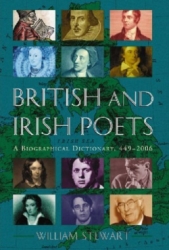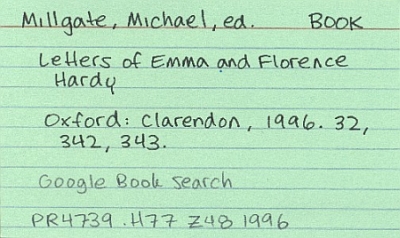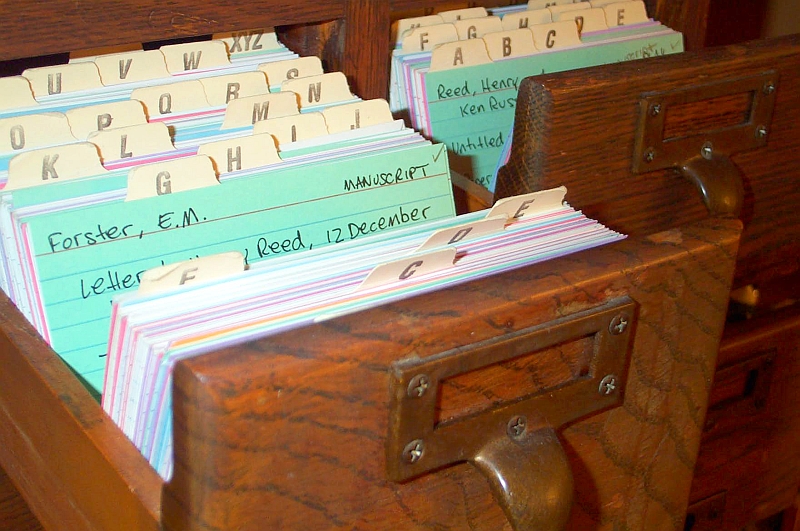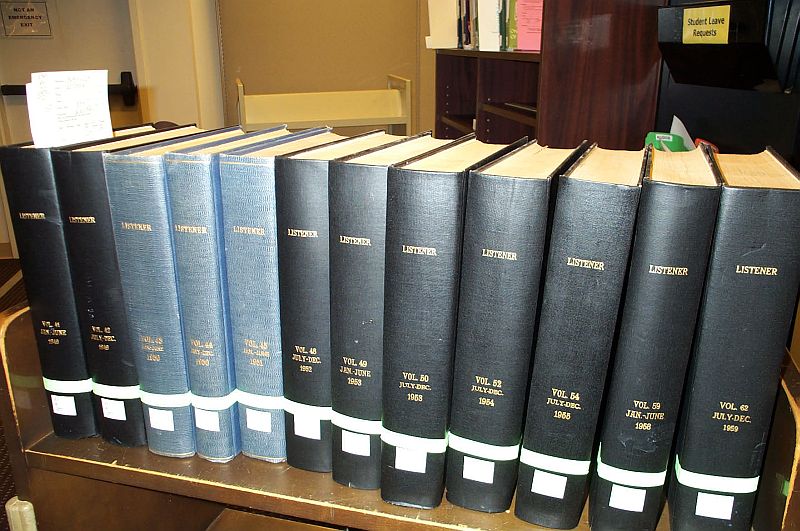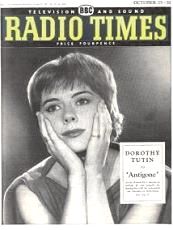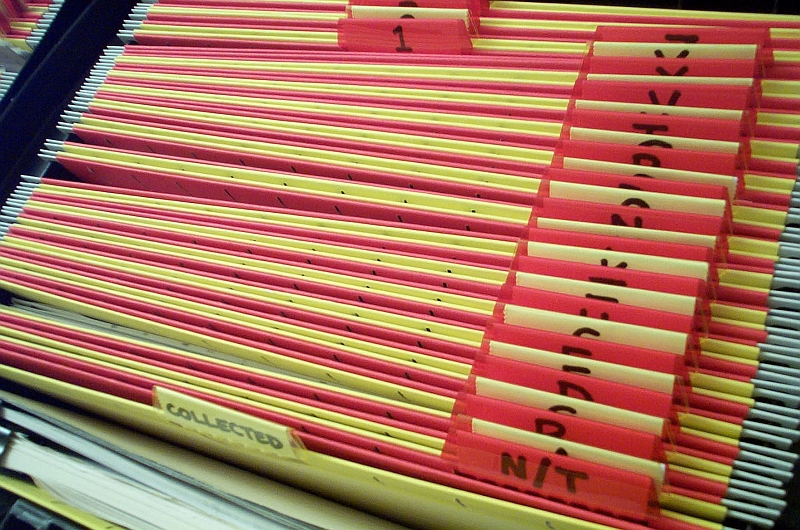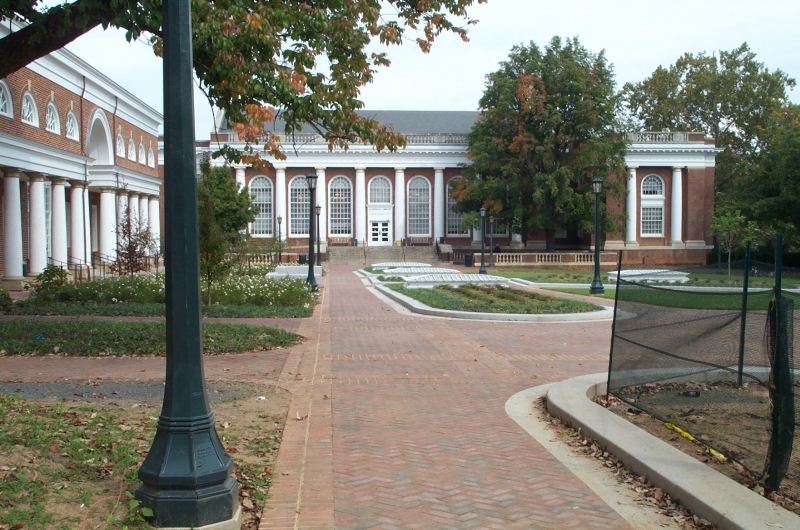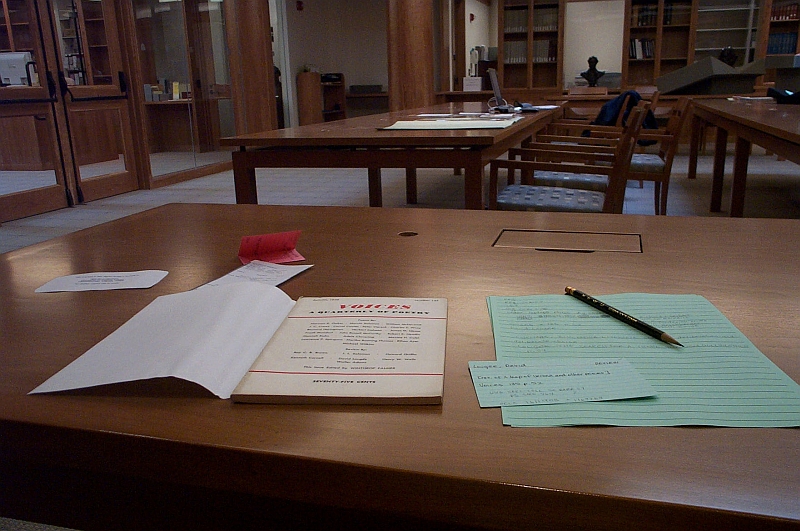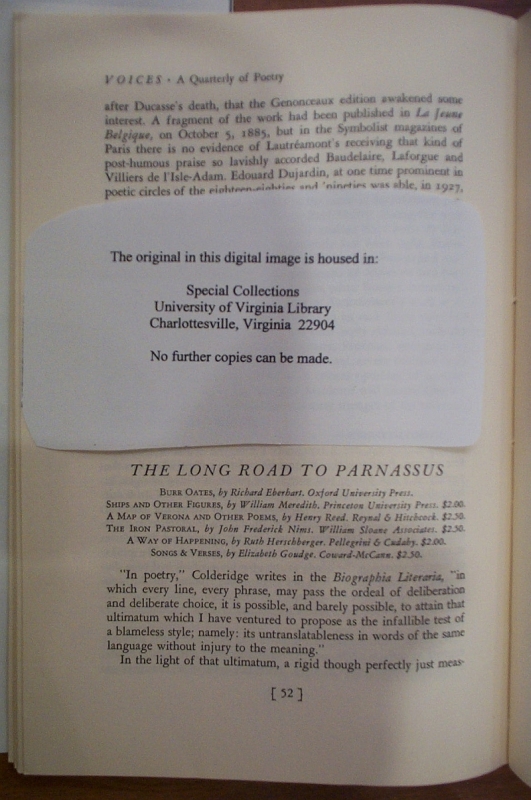|
|
Documenting the quest to track down everything written by
(and written about) the poet, translator, critic, and radio
dramatist, Henry Reed.
An obsessive, armchair attempt to assemble a comprehensive
bibliography, not just for the work of a poet, but for his
entire life.
Read " Naming of Parts."
|
Contact:
|
|
|
|
Reeding:
|
 |
I Capture the Castle: A girl and her family struggle to make ends meet in an old English castle.
|
 |
Dusty Answer: Young, privileged, earnest Judith falls in love with the family next door.
|
 |
The Heat of the Day: In wartime London, a woman finds herself caught between two men.
|
|
|
|
Elsewhere:
|
|
All posts for "Bibliography"
|
|
|
21.12.2024
|
about which I am very excited, but will have to wait until after the holiday weekend for inquiry: Henry Reed. "Bij de dood van T.S. Eliot." Litterair Paspoort 20 (1965): p. 51.
Henry Reed et al. "Rates for Reviewing." Author, Playwright and Composer 57, no. 4 (Summer 1947): p. 64. The first appears in a Dutch journal, and the title translates as "On the Death of T.S. Eliot" (who had died in January of 1965). Looking at the issue's contents, it's possible the article appears in both Dutch and English, translated by C. Buddingh'
The second appears in the journal of the Society of Authors, and appears to be a questionnaire put to such talent (including Reed) as John Betjeman, Daniel George, Rayner Heppenstall, H.J. Massingham, William Plomer, Herbert Read, C.E. Vulliamy, and C.V. Wedgwood.
Stay tuned!
|
1541. Trewin, J.C., "Old Master." Listener 53, no. 1368 (19 May 1955), 905-906.
Trewin's review of Henry Reed's radio drama, Vincenzo.
|
Excellent synopses of two of Reed's classically-themed poems can be found in Past Ruined Ilion: A Bibliography of English and American Literature Based on Greco-Roman Mythology, by Jeanetta Boswell (Metuchen, NJ: Scarecrow Press, 1982). Oddly, Boswell neglects the third poem in the triptych, "Antigone."
REED, Henry (1914- , English)
1015 "Chrysothemis," in A Map of Verona. London: Cape, 1946. This daughter of Agamemnon and Clytemnestra is presented, as a minor character, only in Sophocles' "Electra." In this play she is sympathetic to her sister's loyalty to their murdered father, but is opposed to defying Clytemnestra and Aegisthus. In Reed's poem, narrated by Chrysothemis herself, she is the haunted survivor of the many tragedies that befell the House of Atreus. She is haunted by the memory of her father's murder at the hands of her mother and Aegisthus; she remembers her brother, Orestes, who later killed Clytemnestra and Aegisthus; she recalls Orestes and Electra fleeing for their lives—she alone remains, to protect and watch over the innocent children of Clytemnestra and Aegisthus. She declares herself "not guilty of anybody's blood," and yet the conclusion of the poem raises the question of her guilt: was she guilty by means of association, by what she did not do rather than what she did? Finally, the all-important question, will she protect the innocent children, or will the old avenging fury fall on them also? There is little mythology concerning these children—a son, Aletes, and a daughter, Erigone. One source says that Orestes killed them when he returned from exile after his mother's death.
1016 "Philoctetes," in A Map (1946), is a lengthy monologue in which the hero reviews his past life and tries to analyze his future. Ten years ago he had been put ashore on the island of Lemnos by Odysseus and other men of the ship because they could no longer bear the stinking wound that Philoctates [sic] had incurred. With him they also put ashore his bow and arrows, the gift that he had inherited from Heracles. Through all these years he has suffered—mentally, from the isolation and loneliness, and physically, from the great wound that would not be healed. He grew bitter and rancorous, but always he knew that Troy could not be taken without him and his bow and arrows. Now they have come for him, and he says, "I have changed my mind; or my mind is changed in me." He prepared to depart with Neoptolemus, the son of Achilles, and Odysseus, whom he has hated above all others. "The wound is quiet, its death/ Is dead within me," he says.[pp. 208-209]
|
1540. Trewin. J.C., "Keeping It Up." Listener 52, no. 1342 (18 November 1954), 877. 879.
Trewin's review of Henry Reed's operatic parody, Emily Butter.
|
In the introduction to her 1986 book, English Poetry of the Second World War: A Biobibliography, Catherine W. Reilly ranks the number of appearances various poets make in the 87 anthologies of World War II poetry she inventories:
Roy Fuller (25)
Alun Lewis (24)
Sidney Keyes (21)
Stephen Spender (19)
Keith Douglas (18)
John Pudney (18)
Alan Rook (17)
Louis MacNeice (15)
Henry Reed (15)
W.H. Auden (14)
G.S Fraser (14)
Dylan Thomas (14)
John Waller (14)
Emanuel Litvinoff (13)
Henry Treece (13)
Cecil Day Lewis (12)
Herbert Corby (11)
Nicolas Moore (11)[p. xiii] Reilly's bibliography doesn't dispel the idea that Henry Reed's Lessons of the War are the most-anthologized poems from the Second World War, just that Reed doesn't necessarily appear in the majority of anthologies of Second World War poetry.
The fifteen anthologies on Reilly's list that Reed appears in are:
An Anthology of Modern Verse, 1940-1960, chosen by Elizabeth Jennings (London: Methuen, 1961)
Components of the Scene: Stories, Poems, and Essays of the Second World War, edited by Ronald Blythe (Harmondsworth, Middlesex: Penguin, 1966)
English Poetry, Book 5: Modern Verse, edited by W.M. Smyth (London: Edward Arnold, 1971)
I Burn For England: An Anthology of the Poetry of World War II, selected by Charles Hamblet (London: Leslie Frewin, 1966)
The Martial Muse: Seven Centuries of War Poetry, edited by Alan Bold (London: Wheaton, 1976)
More Poems from the Forces: A Collection of Verses by Serving Members of the Navy, Army, and Air Force, edited by Keidrych Rhys (London: Routledge, 1943)
New Poems, 1944: An Anthology of American and British Verse, with a Selection of Poems from the Armed Forces, edited by Oscar Williams (New York: Howell, Soskin, 1944)
Poetry of the Forties, edited by Robin Skelton (Harmondsworth, Middlesex: Penguin, 1968)
Poetry of the 1940s: An Anthology, edited by Howard Sergeant (London: Longman, 1970)
The Poetry of War, 1939-45, edited by Ian Hamilton (London: Alan Ross, 1965)
The Terrible Rain: The War Poets 1939-1945, selected by Brian Gardner (London: Eyre Metheun, 1978)
These Years: An Anthology of Contemporary Poetry, edited by Howard Sergeant (Leeds: E.J. Arnold & Sons, 1950)
The Voice of Poetry, 1930-1950: An Anthology, edited by Hermann Peschmann (London: Evans Bros., 1950)
War Poetry: An Anthology, edited by D.L. Jones (London: Pergamon, 1968)
Where Steel Winds Blow, edited by Robert Cromie (New York: David McKay, 1968) Also, someone needs to make poor Herbert Corby ( Hampdens Going Over [1945]) a Wikipedia page.
|
1539. Trewin, J.C. "Dead and Alive." Listener 50, no. 1281 (17 Sepetember 1953): 479-480.
Trewin's review of the BBC Third Programme premiere of Reed's play, A Very Great Man Indeed.
|
Imagine my surprise, poking about for Reed references in Google Book Search, when what should I come across? Our very own website, The Poetry of Henry Reed, cited as a source in British and Irish Poets: A Biographical Dictionary, 449-2006, edited by William Stewart (2007).
From Amazon.com's product description: "From John Abbot to Benjamin Zephaniah, this reference book contains information on 1,270 poets from England, Scotland, Wales, and Ireland. Writing over a 1,500 year period, the featured poets are representative of periods from the Old English era to the Post-Modern age."
I know the site has been used to produce at least two other scholarly articles, but this is the first time I've actually seen it cited!
|
1538. Walker, Roy. "Betti and the Beast." Listener 58, no. 1492 (31 October 1957): 713-714.
Review of Henry Reed's translation of Ugo Betti's Irene, broadcast on the Third Programme on October 20, 1957.
|
Graves, Robert. "War Poetry in this War." Listener 26, no. 667 (23 October 1941): 566.
Korte, Barbara, Ralf Schneider, and Stephanie Lethbridge, eds. Anthologies of British Poetry: Critical Perspectives from Literary and Cultural Studies. Amsterdam: Rodopi, 2000.
Lehmann, John, comp. Poems from New Writing, 1936-1946. London: John Lehmann, 1946. 85-97.
"Phenological Report." Quarterly Journal of the Royal Meteorological Society 69 (1943).
Reed, Henry. "A Map of Verona." Listener 27, no. 687 (12 March 1942): 343.
Reed, Henry. Review of Four Quartets, by T.S. Eliot. Time and Tide (9 December 1944).
Rhys, Keidrich, ed. More Poems from the Forces: A Collection of Verses by Serving Members of the Navy, Army, and Air Force. London: G. Routledge & Sons, 1943.
Camera batteries
Tire pressure
Windshield wiper fluid
|
1537. Radio Times, "Full Frontal Pioneer," Radio Times People, 20 April 1972, 5.
A brief article before a new production of Reed's translation of Montherlant, mentioning a possible second collection of poems.
|
Here's how it goes: I'm sifting through Google Book Search or Amazon's Search Inside the Book, and a reference to Henry Reed materializes out of the ether: maybe a footnoted quotation, or just a passing comparison to another poet. If it's something Reed himself wrote, I can usually recognize it by name. I'll check the bibliography online, and if the article or book doesn't already appear, I'll e-mail myself a link or the pertinent information. Later, I'll pull out my portable, plastic card file and fill out a new index card. I'm using colored cards to indicate items that I don't own.
From Richard Altick's excellent and invaluable The Art of Literary Research (1963), the chapter entitled, "Making Notes":
For every book and article you consult, make out a bibliographical (three-by-five) slip. If your project is a fairly modest one, to be finished in one or two months' time, before your memory starts to fail, this point is not so important; in such a case, modify the rule to read "for every book and article in which you find information." But if you are working on a dissertation or book, it is extremely useful to keep a record of every source you examine, whether or not you take anything from it. A few months later, running across a reference to a certain article that sounds as if it might be valuable, you may forget whether or not you looked at it. Quick recourse to your file of bibliographical slips may save you, at the very least, the labor of hunting it down again in the library and, often, the trouble of re-reading it.
On the face of the bibliographical slip, copy the author, title, edition (if any is specified), place and date of publication, and (if it is a fairly recent book) the publisher. Or, if it is an article you are recording, note the author, title, periodical, volume number, year, and pagination. Always take this information from the source itself as it lies before you, never from any reference in a bibliography or someone else's footnote. Authors' initials and the exact spelling of their names, the titles of books and articles, and dates have a way of getting twisted in secondary sources. Play safe by getting your data from the original, and doubly safe by re-checking once you have copied down the information. On the face of the same slip—I use the bottom lefthand corner—record the call number of the book or periodical, and if it is shelved anywhere but in the main stacks of the library, add its location. If you have used the item at a library other than your headquarters, record that fact too ("Harvard," "Newberry," "Stanford"). These are small devices, seemingly unimportant, but in the aggregate they are tremendous timesavers if you are dealing with hundreds of sources and the storage space in your brain is reserved, as it should be, for more vital matters.
On the back of the bibliographical slip, I usually write a phrase or even a short paragraph of description and evaluation, again to refresh my memory two or three years after I have used the book. Since nobody sees these slips but me, I am as candid, peevish, scornful, or downright slanderous as I wish; if a book is bad, I record exactly what its defects are, so that I will not refer to it again or, if I have to do so, in order that I will remember to use it with extreme caution. If, on the other hand, it is a valuable book, I note its outstanding features. And I also record just what, if anything, it has contributed to the study on which I am engaged. Perhaps I also leave a memo to myself to re-read or re-check certain portions of it at a later stage of research, when conceivably it will provide me with further data that at this point I do not anticipate I shall need. Finally—and this is particularly recommended to students whose research requires them to scan large quantities of dull material, such as rambling four-volume Victorian literary reminiscences—I note the degree of exhaustiveness with which I inspected the item, by some such phrase as "read page by page" or "thoroughly checked index." Similarly, I recommend that you make a slip for every bibliography you have consulted, so that you can be sure you have not inadvertently overlooked it.
If it is one of the serial bibliographies of literary scholarship, such as the annual bibliography of studies in romanticism, record the precise span of years you've covered. If it is a subject bibliography, such as Poole's Index, list the individual entries under which you have looked ("Education," "Literature," "Reading") in case other possibilities occur to you later on. Once again, the whole idea is to save wasteful duplication of effort. Three or four minutes spent in making such a slip can save a whole day's work a year or two later.
For more on creating bibliography cards for a research project, here's an online style manual.
|
1536. L.E. Sissman, "Late Empire." Halcyon 1, no. 2 (Spring 1948), 54.
Sissman reviews William Jay Smith, Karl Shapiro, Richard Eberhart, Thomas Merton, Henry Reed, and Stephen Spender.
|
Armstrong, Martin. "The Spoken Word." Critic on the Hearth. Review of Noises, by Henry Reed. Listener 36, no. 933 (28 November 1946): 767.
Baker, Kenneth, ed. Unauthorized Versions: Poems and Their Parodies. London: Faber and Faber, 1990.
Bridson, D.G. The Christmas Child. London: Falcon, 1950. 10.
Carpenter, Humphrey. The Envy of the World: Fifty Years of the BBC Third Programme and Radio 3, 1946-1996. London: Weidenfeld and Nicolson, 1996.
Cox, Michael, ed. "Reed, Henry." A Dictionary of Writers and Their Works. Oxford: Oxford University Press, 2001.
Feinstein, Herbert. Review of Three Plays by Ugo Betti, translated by Henry Reed. Prairie Schooner 35, no. 2 (June 1961): 180-182.
Hamilton, Ian. "The Forties II." London Magazine 4, no. 3 (June 1964): 67-71.
Heppenstall, Rayner. Portrait of the Artist As a Professional Man. London: Peter Owen, 1969.
Jones, David. Letter to the editor. Listener 50, no 1270 (2 July 1953): 22.
Kenner, Hugh. The Invisible Poet: T.S. Eliot. London: Methuen, 1965. 268.
Korte, Barbara, Ralf Schneider, and Stephanie Lethbridge, eds. Anthologies of British Poetry: Critical Perspectives from Literary and Cultural Studies.
Amsterdam: Rodopi, 2000.
Lehmann, John, comp. Poems from New Writing, 1936-1946. London, 1946.
Ling, Peter, comp. Gentlemen at Arms: Portraits of Soldiers in Fact and Fiction, in Peace and War. London: Owen, 1969.
Magalaner, Marvin, and Richard M. Kain. Joyce: The Man, The Work, the Reputation. New York: New York University Press, 1956. 349.
Pascoe, David. "The Hollow Men." Oxford Poetry 6, no. 2 (Winter 1991).
Radio Times, ( The Primal Scene, As It Were), 7 March 1958.
Radio Times, "Studies of the Italian Poet," 27 May 1949.
Redlich, Hans F. Letter to the editor (Monteverdi). New Statesman and Nation 35, no. 882 (31 January 1948): 94.
Reed, Henry. (Article on W.H. Auden's poetry). The Mermaid (University of Birmingham student magazine) 1932-36?
Reed, Henry. "Autumn Books." Review of Some Recollections, by Emma Hardy. Listener 66, no. 1700 (26 October 1961): 678.
Reed, Henry. Book review. Listener (3 October 1946).
Reed, Henry. "The Builders." Listener 22, no. 549 (20 July 1939): 143.
Reed, Henry. "Christmas Books." Listener 34, no. 882 (6 December 1945): 669.
Reed, Henry. "Correspondence." Listener 33, no. 840 (15 February 1945): 185.
Reed, Henry. "Correspondence." Listener 33, no. 843 (8 March 1945): 271.
Reed, Henry. "The Door and the Window." Listener 32, no. 825 (2 November 1944):
488.
Reed, Henry. ( The Great Desire I Had). Radio Times (24 October 1952): 7.
Reed, Henry. "Iseult Blaunchesmains." Listener 30, no. 781 (30 December 1943): 756.
Reed, Henry. Letter to the editor. Listener 40, no. 1028 (7 October 1948): 529.
Reed, Henry. "Max Gate: Memories of Hardy's Home." Birmingham Post, 15 June 1938.
Reed, Henry. "Morning." Listener 32, no. 811 (27 July 1944): 96.
Reed, Henry. "New Novels." Listener 36, no. 928 (24 October 1946): 570.
Reed, Henry. "New Novels." Listener 36, no. 930 (7 November 1946): 644.
Reed, Henry. "New Novels." Listener 36, no. 933 (28 November 1946): 766.
Reed, Henry. "New Novels." Listener 36, no. 935 (12 December 1946): 856.
Reed, Henry. "New Novels." Listener 37, no. 938 (2 January 1947): 36.
Reed, Henry. "New Novels." Review of Dangling Man, by Saul Bellow. Listener 37, no. 940 (16 January 1947): 124.
Reed, Henry. "New Novels." Listener 37, no. 395 (6 March 1947): 344.
Reed, Henry. "Poem." Listener 18, no. 468 (29 December 1937): 1416.
Reed, Henry. "Poem." Listener 22, no. 556 (7 September 1939): 486.
Reed, Henry. "Poem." Listener 23, no. 587 (11 April 1940): 750.
Reed, Henry. "Poetry in Wartime I: The Older Poets." Listener 33, no. 836 (18 January 1945): 69.
Reed, Henry. "Poetry in Wartime II: The Younger Poets." Listener 33, no. 837 (25 January 1945): 100-101.
Reed, Henry. "The Return." Listener (28 December 1944).
Reed, Henry. Review of A Poet's War: British Poets and the Spanish Civil War, by Hugh D. Ford. Sunday Times (London), 5 September 1965, 39.
Reed, Henry. Review of Expositions and Developments, by Igor Stravinsky and Robert Craft. Sunday Telegraph, (pre-June 7) 1962.
Reed, Henry. Review of Four Quartets, by T.S. Eliot. Time and Tide (9 December 1944).
Reed, Henry. "Sonnet." Listener 36, no. 927 (17 October 1946): 498.
Reed, Henry. "South." Listener 19, no. 438 (13 April 1938): 806.
Reed, Henry. ( The Streets of Pompeii). Radio Times (14 March 1952): 11.
Reed, Henry. "Tintagel." Listener 28, no. 720 (29 October 1942): 564.
Reed, Henry. "Travel Books." Listener 65, no. 1659 (12 January 1961): 91.
Reed, Henry. "Two Novels." Reviews of All Hallow's Eve by Charles Williams, and The Only Door Out by Mary Wilkes. New Statesman and Nation 29, no. 733 (10 March 1945): 160.
Reed, Henry. "What the Wireless Can Do for Literature." BBC Quarterly 3 (1948-1949): 217-219.
Rodman, Selden. "Albion's New Versifiers." Review of The New British Poets, edited by Kenneth Rexroth. New York Times Book Review, 19 December 1948, 4.
Scott, John. "Three Plays by Ugo Betti." Italian Quarterly, 1958: 72-74.
Sinclair, Andrew. War Like a Wasp: The Lost Decade of the 'Forties. London: Hamish Hamilton, 1989. 45, 69, 79, 94, 107, 109, 111, 114, 218, 219, 297, 301, 302, 316.
Sinfield, Alan, ed. Society and Literature, 1945-1970. New York: Holmes & Meier, 1983. 160.
Sissons, Michael, and Philip French, eds. Age of Austerity. London: Hodder and Stoughton, 1963. 224.
St. John, Christopher. Ethel Smyth: A Biography. London: Longmans, 1959. 250-255.
Suttor, T.L. Review of The Novel Since 1939, by Henry Reed. Southerly 9, no. 4 (1948): 231-232.
Temple, Ruth Zabriskie, Martin Tucker, and Rita Stein, comps. Vol 3, Modern British Literature. New York, F. Unger: 1966.
Val Baker, Denys, ed. Little Reviews Anthology. London: Eyre and Spottiswoode, 1946.
* Citations may be vague. Pagination is approximate. May or may not actually contain a reference to Mr. Reed. More available in the full bibliography.
|
1535. Reed, Henry. "Talks to India," Men and Books. Time & Tide 25, no. 3 (15 January 1944): 54-55.
Reed's review of Talking to India, edited by George Orwell (London: Allen & Unwin, 1943).
|
I've been trying to tidy up around here: index cards have begat unsorted piles out-of-boxes; Xeroxes are backing up into heaps the cat perches upon, unstapled and unread; and I've been neglectful in answering Reed-mail. One of these days I gotta get myself organizized.
Long, cathartic hike to the library today, which paid off in several citations to track down. The university library is about three miles' worth of sidewalk away, on the other side of a good-sized hollow, down and up again. My path crosses the edge of a small lake, and there are herons, ducks, and sometimes even a bald eagle. Bonus points today for taking a side-trip to the bookstore for coffee, an extra two miles. (I'm working at getting over my irrational fear of ordering frou-frou espresso drinks from cafe baristas.)
Today's agenda was to read a bit on British poetry movements from the first half of the twentieth-century. Reed defies classification, and doesn't usually get grouped with anyone except "Poets of the Second World War." Browsing, I found a book on war poetry called Spirit Above Wars (Macmillan Company of India, 1975), by A. Banerjee. The title is taken from a 1917 letter Robert Graves wrote to Wilfred Owen:
For God's sake cheer up and write more optimistically—The war's not ended yet but a poet should have a spirit above wars.
A general chapter on the poetry of World War II brings up, once again, the question which was asked many times from 1939 to 1945: "Where are the war poets?" (see " A Call to Arms", previously). Cited are several articles: "Where Are Our War Poets?" ( Horizon, January 1941), "War and the Poet," by W.D. Thomas ( Listener, 1 May 1941), and Stephen Spender's and Robert Graves' thoughts on "War Poetry in this War" ( Listener, 16 and 23 October 1941). Reed is referenced as having attempted to answer the question before the war's end, in a set of two articles written for The Listener: "Poetry in Wartime: The Older Poets," and "Poetry in Wartime: The Younger Poets" (18 and 25 January 1945).
The Horizon, Spender, and Graves are articles are exciting, but the best part is a quote from a letter to the editor in response to Reed's "Poetry in Wartime" essays, which highlights the contention about the differences between the poems of the First and Second World Wars:
When Henry Reed [....] picked out men like Vernon Watkins, Alun Lewis and Sidney Keyes as the significant poets who had emerged since the start of the Second World War, one correspondent asked, in earnest solemnity:
Now I would like to ask, in a purely scientific-objective spirit, whether there is a single four-line sequence (leave alone an entire short poem) to the credit of any of the poets mentioned by Mr. Reed which has in the same way struck the popular imagination and become property, as did, say, several poems of Rupert Brooke on publication? To this Henry Reed made the blunt rejoinder that Rupert Brooke 'was a poet for the thoughtless; and there is no fundamental difference between his war poetry and the present-day song beginning " There'll always be an England"'.
Oh, schnap! The correct answer to the correspondent's question is, of course: "Today we have naming of parts...." The letter to the editor appears in the February 1, 1945 Listener, and Reed's retort is in the issue of February 15. Two more index cards for the pile, another batch of Xeroxes for the cat to perch on.
|
1534. Reed, Henry. "Radio Drama," Men and Books. Time & Tide 25, no. 17 (22 April 1944): 350-358 (354).
Reed's review of Louis MacNeice's Christopher Columbus: A Radio Play (London: Faber, 1944).
|
I dug through my bookshelves tonight, hunting for my copy of A.S. Byatt's Possession. Ah, here it is: the trade paperback from before the (regretable) film version was released. I've read it twice, and the spine is creased and the corners dulled. When I first read the book, straight through in about two days, I was sure it was a masterpiece (despite the sometimes tedious Victorian verse). On second reading, I was dismayed that it didn't quite captivate me in the same way, and I attributed the discrepancy to my own deprivations the first time around.
It was Possession which originally inspired me to begin organizing the bibliography, first with 3x5 index cards, and then in a database. The obsessed scholars in the novel all keep detailed card indexes, in which they transcribe, outline, and keep track of the minute facts of the lives of their respective authors. Here is a scene between Roland Michell, a research assistant working for the editor of the collected papers of the (fictitious) poet, Randolph Henry Ash, and Beatrice Nest, gatekeeper to the journals of the poet's wife, Ellen Ash:
Could I see your card index, Beatrice?"
"Oh, I don't know, it's all a bit of a muddle, I have my own system, you know, Roland, for recording things, I think I'd better look myself, I can better understand my own hieroglyphics."
She put on her reading glasses, which dangled over her embarrassment on a gilt-beaded chain. Now she could not see Roland at all, a state of affairs she marginally preferred, since she saw all male members of her quondam department as persecutors, and was unaware that Roland's own position there was precarious, that he hardly qualified as a full-blooded departmental male. She began to move things across her desk, a heavy wooden-handled knitting bag, several greying parcels of unopened books. There was a whole barbican of index boxes, thick with dust and scuffed with age, which she ruffled in interminably, talking to herself.
"No, that one's chronological, no, that's only the reading habits, no that one's to do with the running of the house. Where's the master-box now? It's not complete for all notebooks you must understand. I've indexed some but not all, there is so much, I've had to divide it chronologically and under headings, here's the Calverley family, that won't do... now this might be it....
"Nothing under La Motte. No, wait a minute. Here. A cross-reference. We need the reading box. It's very theological, the reading box. It appears"—she drew out a dog-eared yellowing card, the ink blurring into its fuzzy surface—"it appears she read The Fairy Melusina, in 1872."
She replaced the card in its box, and settled back in her chair, looking across at Roland with the same obfuscating comfortable smile.
There you have it: the entirety of my formal training in literary research.
I was brought back to Possession this evening by stumbling across Pile of Indexcards, which lovingly blogs, in painstaking detail, a similar system of organization. Indexcard + Tagging + Chronological order = "Indexcarding". Accompanied by a terrific photoset on Flickr. I particularly like the tagging and starring methods.
|
1533. Friend-Periera, F.J. "Four Poets," Some Recent Books, New Review 23, no. 128 (June 1946), 482-484 [482].
A short review calls A Map of Verona more pretentious than C.C. Abbott's The Sand Castle; influenced by Eliot, Auden, MacNeice, and Day Lewis.
|
Four days and a fistful of dollars in photocopier fees later, my little collection is heavier by a grand total of 20 articles: no fewer than 16, primary source, Reed-written book reviews and talks; one Reed poem as it originally appeared at publication; and three reviews of his radio work by secondary authors. All culled from 12 volumes of the BBC's Listener, spanning just nine years, 1949-1958:
I also managed to eliminate several duplicate records in the bibliography owing to innaccurate or incorrect citations, and deleted a couple of leads which turned out to be dead ends (more mistaken references to Sir Herbert Read. Damn poseur).
The haul includes several essential and long sought-after items, including Reed's two-part radio essay on the problems of dramatic writing ("Towards 'The Cocktail Party'"); Reed's take on Joyce's effect on the English novel ("The Triple Exile"); and "'If and Perhaps and But'," a look at Eliot's critical prose.
The last two days, when I sidled up to the library copier, I discovered the previous user had left the machine set to the scanner, instead of for simply making copies. I didn't think much of it, but then I had a sudden epiphany: the library copiers are set up to scan straight to email! We have this luxury on the staff copy machines, of course. But it wasn't until this evening that I even dared to imagine that the public machines have this marvelous capability. I do dream in a dream.
Next up: "Reeding Lessons" tackles The New Statesman and Nation!
|
1532. Vallette, Jacques. "Grand-Bretagne," Mercure de France, no. 1001 (1 January 1947): 157-158.
A contemporary French language review of Reed's A Map of Verona.
|
I had a couple of unexpected days off last week, owing to construction going on at the library where I work. I planned to use one of these gifted days to drive down to the libraries at Duke University, and wallow, neck-deep, in their magnificently complete journal collections. Even better than UVA's, in my opinion. I still have a ton of outstanding, unseen articles to check: undiscovered countries.
Then, my little tuxedoed cat fell ill.
I've always told the cat, "You better not ever got sick, stinky man. Not on our budget. Not unless you go out and get yourself a job with some health insurance!" Of course, when El Gato started spouting nastiness at both ends, I immediately stuffed him in the catbag and hauled him over to the vet. A thousand dollars later, he's his old self again (mostly).
So the photocopying trip to Duke has been postponed. I did, however, pull all the index cards for outstanding citations. It's quite a little stack. Here's the totals:
Listener, 1937-1962 Articles by Reed: ~61
Other authors: 6 New Statesman and Nation, 1938-1961 Articles by Reed: ~31
Other authors: 1
Total: ~99 And that's just two titles! Some may be duplicates or red herring, but that's still too many articles to hope to run down in one day's visit. Even copying from microfilm. Maybe I should get a hotel, stay overnight? If I can get a couple of days off, and the cat can find a job.
|
1531. Henderson, Philip. "English Poetry Since 1946." British Book News 117 (May 1950), 295.
Reed's A Map of Verona is mentioned in a survey of the previous five years of English poetry.
|
Here's an example of an hour's labor after work, typical of a take I bring home a couple of nights a week: - How the Heart Will Endure: Elizabeth Bowen and the Landscape of War, by Heather Bryant Johnson (University of Michigan Press, 1992). Quotes Reed's review of Bowen's "Everything's Frightfully Interesting" (also known also "Careless Talk," which makes fun of self-important men doing top secret work for the War Office), from her collection of short stories The Demon Lover.
- Sursum Corda! The Collected Letters of Malcolm Lowry, v. I: 1926-1946, and v. II: 1947-1957, edited by Sherrill E. Grace (University of Toronto Press, 1995-1996). Lowry apparently wrote a radio adaptation of Moby Dick in 1945, but after eight months hadn't heard back from the Canadian Broadcasting Corporation, by which time Reed's version had been produced by the BBC.
- The Eighth Lively Art: Conversations with Painters, Poets, Musicians, and the Wicked Witch of the West, by Wesley Wehr (University of Washington Press, 2000). Wehr remembers Elizabeth Bishop teaching at the University of Washington in the mid-1960s, the same time as Reed.
- Skeptical Music: Essays on Modern Poetry, by David Bromwich (University of Chicago Press, 2001). Mentions Reed's poem "Hiding Beneath the Furze" appearing in Robin Skelton's 1964 anthology, Poetry of the Thirties.
Now if you'll excuse me, I have to go fill out index cards for this evening's bounty.
|
1530. Radio Times. Billing for "The Book of My Childhood." 19 January 1951, 32.
Scheduled on BBC Midland from 8:15-8:30, an autobiographical(?) programme from Henry Reed.
|
Early last fall, some months after going live with these pages, I was doing a bit of vanity-googling, to try and discern how I was progressing at enticing search engines to index the blog. In the course of those searches, I came across a paper entitled " Semantic Blogging and Bibliography Management" (Cayzer and Shabajee, 2003), which literally made me think about blogging in a whole different light.
The basic idea is that a weblog, with its structured, common elements like links, author and title, categories and tags, is an ideal medium for creating and sharing bibliographic information. (Demonstrator blog, normal and " record card" views).
I was simultaneously struck by two thoughts. One: that I had wasted a lot of time learning PHP and SQL, when all I needed was a LiveJournal account. And B: that in hammering together a backend, and filling up the bibliography, I had essentially created a blog. (Which, while comforting, more or less makes the blog somewhat superfluous.)
Then, along came Google Base which, I admit, I completely didn't get at the time. It was like staring at an atlatl, trying to deduce its purpose without the benefit of having seen some practiced Cro-Magnon chuck a lance at a mammoth. "You want me to put my data where?" Then I found The History Librarian's bibliography of Georgia labor history, and Chris Karr's collection of H.P. Lovecraft copyright research, and I totally got it. You don't use Google Base to create a bibliography. It is a bibliography. All you have to do is add to it.
Most recently in this same ilk (and via Librarian.net), there rises Casey Bisson's prototype library catalog, assembled out of WordPress' blogging platform and some nifty household appliances. (Holy Schnikes!) Jenny Levine has posted a nice summary of how the OPAC works at the ALA TechSource blog.
This sort of terrible vision — the ability to look at the same tools everyone else is using and invent new applications — is awfully humbling. I'm pounding rocks into crude wheels, and all I can think to do with them is squash pesky mice.
|
1529. Sackville-West, Vita. "Seething Brain." Observer (London), 5 May 1946, 3.
Vita Sackville-West speaks admirably of Reed's poetry, and was personally 'taken with the poem called "Lives," which seemed to express so admirably Mr. Reed's sense of the elusiveness as well as the continuity of life.'
|
And the winner is... David Jones, ladies and gentlemen!
It was two years ago this month that I first wrote the code which enabled me to display the Reed bibliography on the web. The code is a heinous mish-mosh of ifelse loops, created to display records in some semblance of order by author, title and date. As it has grown, the database has become less and less useful, at least to those unschooled in the esoteric skill of Ctrl>F or Edit>Find in This Page.
Tonight, I am celebrating the input of the 1,000th record into the bibliography. Entries from the bibliography, you may have observed, are framed in gray boxes between posts in this blog. If you watch closely, you'll be able to see them roll over from nine hundred ninety-nine to one thousand, just like watching an odometer. I'm celebrating this achievement with a lovely red wine from the vineyards of Spain, and after two glasses I am absolutely in no shape for data entry.
(In the interest of full disclosure, I should point out that, while this is the 1,000th entry, it is not the 1,000th record. I have deleted about fifty-odd duplications or books which eventually turned out to not actually mention Reed. So it's really the 947th record.)
This evening, I went to a lecture on ancient libraries, given by Professor George W. Houston. The lecture room was standing-room only: apparently, the Roman Civilizations professor was offering extra credit for attending. So, squashed between row upon row of sophomores, I sat and listened about Herculaneum's Villa of the Papyri, Oxyrhynchus' town dump, and the library in the Temple of Trajan.
Professor Houston's presentation was billed as "A User's Guide" to libraries in the Roman world. He has been attempting to discover how private and public libraries functioned in regard to their users in the ancient world, through scant evidence left in fragments of papyrus scrolls and codices. On the handout provided, Houston provided a translation of an inscription found in the Agora of Athens, pertaining to the Library of Pantainos (2nd-century, A.D.): No book shall be taken out, for we have sworn an oath. Open from the first hour to the sixth. Those, the Professor stressed, are the only official library regulations surviving from the ancient world.
After the lecture, I actually popped over to the library, since they had emailed me earlier that the book I had requested from offsite storage was ready and waiting. The book was Epoch and Artist: Selected Writings by David Jones (Grisewood, ed., 1959). It seems all the books I need are in offsite storage, these days. I opened it with no expectation of finding anything related to Reed, and after glancing at the title page and copyright, turned to the index. There it was: an entry for "Reed, Henry, 278-79." The indicated pages turned out to be a reprint of a letter to the editor Jones wrote to The Listener in 1953, in response to Reed's essay, "If and Perhaps and But."
"If and Perhaps and But" is a review of T.S. Eliot's critical prose in which Reed argues that, sometime between the early 1920s and 1950s, "something happened whereby it is now possible for the poet to implement a 'formal artistic discipline derived from the outside'" (Jones quoting Reed). Mr. Jones goes on for three paragraphs requesting an elaboration because, apparently, he cannot for the life of him figure out what "something" Reed is talking about.
Neither can I, for that matter, as I have yet to track down a copy of that particular Listener. Regardless, David Jones has the distinction of being the 1,000th record entered into the bibliography. And the 1,001st, too, since thoroughness dictates that I must cite the original letter as well as the reprint! Thank you, Mr. Jones!
|
1528. Manning, Hugo. "Recent Verse." Books of the Day, Guardian (Manchester), 31 July 1946, 3.
Manning feels that 'Mr. Reed has worn thin much of his genuine talent in this direction by too much self-inflicted censorship.'
|
Aphorism: Everyone at Library of Congress is working on something more interesting than you. Everywhere I went — the elevators, the halls, Photoduplication Services — people were talking about their research, and each topic was infinitely more exciting and erudite than my little project.
In the elevator, there was a gentleman who casually mentioned his dissertation was on race relations in an exotic country during some dimly-remembered century. At the photoduplication desk, it was a lady who was ordering full-size copies of pages of the London Times, to be shipped to a friend in New England. And in the Adams reading room, an affable fellow across the table was impatiently awaiting a journal containing an article concerning cellular automata (Wolfram's A New Kind of Science was recommended as a starting point).
Myself? I had travelled several hours by car and by train to make copies of old t.v. guides.
Well, okay. Not actual T.V. Guides. I was looking for issues of the BBC's Radio Times which immediately preceded broadcasts of Henry Reed's radio plays. I had seen few, scattered mentions of articles written by or about Reed, notably in Roger Savage's unrivalled chapter in British Radio Drama (Drakakis, ed., 1981); The Diversity Website's "Henry Reed radio drama" page; and poking around the inventories of dealers in rare back issues of U.K. magazines.
The Library of Congress is a venerable institution. Venerable and inveterate. Waved through metal detectors by uniformed security (please place your cellphone on the X-ray machine's conveyor, not in the plastic bin with your keys), you must shed your coat and bag at the cloakroom, and proceed to the reading rooms without the benefit of the protective layers to which you are accustomed, a naked scholar. You fill out your slips requesting your obscure volumes, and the desk attendant roughly crams them (along with everyone else's) into a small brass cylinder about the size of can of tomato paste. The cylinder disappears into a pneumatic tube and is whoooshed away into the bowels of a national library that occupies three city blocks. Now you have about an hour to study and memorize the intricately carved and muraled ceilings (you notice a predominant theme on owls), near the end of which you will suddenly realize that you failed to fill out a slip for the single volume on which your day's research will hinge. Then you will hear a distant rumble, a shudder or deep vibration — like the building is directly under the landing path of an international airport — and an ancient dumbwaiter bearing the immovable weight of your books rises, rises behind the counter, and in a moment, the attendant bears them lovingly to your desk. He makes two trips. Some of the resulting .pdfs:
"Captain Ahab and the Great White Whale." ( Moby Dick).
"The Prisoner in the Palazzo." ( The Unblest).
"Did Shakespeare Go To Italy?" ( The Great Desire I Had).
"Homage to Dame Hilda — Or Swann's Way." ( Musique Discrète).
I learned a few things: 1) Reader Identification cards expire every two years. 2) At the cloakrooms, you can request a clear, see-through, plastic bag to tote around your notes and pencils and photocopies without being a security risk. They won't let you in the reading rooms with an accordian file or manila envelope. 3) If you are unsure about the library's run of holdings for a certain periodical, put in requests for your earliest and most recent cites first. See what comes back. 4) The Folger Shakespeare Library is right next door to the Adams building. You can put in your book requests and while away the hour's wait worshipping before a First Folio. 5) Smoking is not allowed anywhere within 50 feet of federal buildings. An ashtray is located approximately 51 feet from the entrance to federal buildings. 6) There is nothing more mysterious and heartbreaking than having your original request slip returned with an X in the dreaded "Not on Shelf" box. Not on shelf? Why? Was it something I did? Something I said? Where is it? It could be many places, but it was decidedly not on the shelf where it resides when it is. On the shelf. And 7) The Washington Monument is huge. It's 554 feet tall. Standing just outside the main entrance to the Madison building, in the shadow of the U.S. Capitol, the obelisk looms on the horizon, seemingly just a short stroll away. It's not. It's a mile and a half, with a backpack full of books and index cards and $20.00 worth of photocopies, warm as newly baked bread.
(Read Part I....)
|
1527. Rosenthal, M.L. "Experience and Poetry." Herald Tribune Weekly Book Review (New York), 17 October 1948, 28.
Rosenthal says Reed shares with Laurie Lee 'that unhappy vice of young intellectuals—a certain blandness of which the ever-simple irony is a symptom.'
|
My most recent adventure begins with, of all things, an online newsletter. Each Thursday, the Librarians' Internet Index, a librarian-selected and -organized catalog of the Web, publishes a list of websites new to their index: " New This Week." In last week's news, there is an entry for a 1999 exhibition by the University of Delaware's Special Collections: The Frank W. Tober Collection on Literary Forgery.
Tober was a chemist by profession, but his interests extended to the study of history, stamp and coin collecting, and a special fascination with the process, results, and detection of literary forgery.
The collection at the University of Delaware Library includes items relating to some of the greatest forgeries of the literary world, including the Ossian poet hoax, the fake Rowley poems, pamphlets forged by Wise and Buxton, and the bogus "Butterfly" books, among others.
A title in the section on " General Material on Forgery" caught my attention: The Scholar Adventurers, by Richard D. Altick (New York: Macmillan, 1950). The book is described as an examination of 'literature's most famous research puzzles,' which immediately piqued my curiousity. I tapped the title into our university's catalog and viola! I had a copy.
The catalog also revealed that the book is the first part of a trilogy which also contains Selective Bibliography for the Study of English and American Literature, and The Art of Literary Research.
I've read the first couple of chapters of the Adventurers, and I can easily say it is the most entertaining book about the pursuit of rare books and personal letters, forgers, and librarying I have read since Perez-Reverte's The Club Dumas, filled with thrilling anecdotes of discovery which take place in musty attics and library file drawers. But it was a few snippets from The Art of Literary Research which inspired my scholarly adventure. Before I even checked it out from the library, I turned to the chapter titled "Making Notes," and found all my labors instantly affirmed and validated:
For every book and article you consult, make out a bibliographical (three-by-five) slip. If your project is a fairly modest one, to be finished in one or two months' time, before your memory starts to fail, this point is not so important; in such a case, modify the rule to read 'for every book and article in which you find information.' But if you are working on a dissertation or book, it is extremely useful to keep a record of every source you examine, whether or not you take anything from it. A few months later, running across a reference to a certain article that sounds as if it might be valuable, you may forget whether or not you looked at it. Quick recourse to your file of bibliographical slips may save you, at the very least, the labor of hunting it down again in the library and, often, the trouble of re-reading it (p. 195-96).
In essence, that is exactly how I decided to proceed, more than a year ago, with my own project. Here, at last, is a research barometer by which I can measure the progress of the bibliography, and acquire new tricks of the trade. For example, Altick suggests using 3x5 slips of high-quality bond paper instead of index cards, since they take up less room. And he recommends typing each entry, instead of writing them by hand, for clarity. Oh, to live in a world where we each still have a manual Underwood typewriter on our desk. At least I have one benefit which Altick did not: an SQL database.
This long, holiday weekend, Altick's authority and enthusiasm inspired me to undertake an adventure that I had originally planned for over the Winter Break, but which, out of laziness and fear, I had ultimately eschewed in favor of cable television and take-away dinners. On Friday, I took the opportunity to revisit Library of Congress, and re-baptize myself in the purifying white light of a photocopier.
(To be continued....)
|
1526. Blunden, Edmund. "Poets and Poetry." Bookman, n.s., 1, no. 4 (July 1946): 14-15.
Edmund Blunden says Reed's Lessons of the War poems 'have captured something of the time-spirit and ambiguity of the recent war in a style of wit and deep feeling united.'
|
It's true: I'm envious of people who own their own filing cabinets. I walk into someone's home or office, my eyes are inexorably drawn to their vertical file, and I find myself saying, "Man. That's a nice filing cabinet. Is that real wood, or laminate?"
Currently, I am storing the documents that make up The Bibliography in two plastic hanging file storage boxes: one for Reed as the author, and the other for secondary sources. This system replaced two large accordian files that I was using up until about a year ago (which I had taken the time to découpage with cutout photographs from magazines). I still use the accordians for toting particular documents back and forth to libraries.
With recent acquistions from old newspapers and journals, however, it's painfully obvious that my collection has outgrown the two file boxes, and that is when I began to grow jealous of other people's office furniture. I found myself browsing the furniture aisles in Target and Staples, and even considered upgrading to leather(ette) file boxes.
Then I happened across this webpage, on the Noguchi filing system. Noguchi Yukio is a Japanese economist who has written several books and articles about filing and organization (see Edward Vielmetti's blog, Vacuum, for more on Noguchi). In this system, "Chou Seiri Hou" (Ultra Management Technique), documents are stored in individual envelopes, labelled and arranged according to the date they were created (or last accessed). Recently used files stay at the left, or current, side of the shelf (or drawer), while older, unused files drift to the right, and can be safely removed.
While the file-by-date system isn't helpful for my purposes, the striking image of all those carefully labelled envelopes got me thinking about storing my files on open shelves, instead of a clunky file cabinet. Wouldn't that be great? A wall of manila, yearning to be thumbed through. Where in town can I go to buy a bunch of modular 15" storage cubes?
|
1525. "Reed, Henry," Publishers Weekly, 152, no. 15 (11 October 1947), 1945.
A note on the publication of the American edition of Reed's A Map of Verona.
|
Or, if you're a stickler, Indices.
When I first got hooked on Henry Reed, I didn't really know how to go about tracking down sources. There was Granger's Index, sure; and the fledgling Internet helped a little (although, a lot of stuff was still being released on CD-Rom, at that time. Ah! The 'Nineties.). Mostly, I was following breadcrumbs: the footnotes in one article would lead me to two others, which led me to three others, et cetera, et cetera, ad infinitum. I'm proud that I did it that way. It was hard work. Detective work.
But recently, I discovered a lot of time and effort could have been saved had I just spent a couple of afternoons and evenings going shelf by shelf, title to title, in the Reference section of the university library.
Reed is hardly obscure. The Lessons of the War and "Chard Whitlow" are widely anthologized. His radio work for the BBC placed him in another milieu entirely, an extensive range. I'm convinced that you cannot swing a cat, living or dead, in any library with the Library of Congress call number "P," without hitting a book that mentions Reed.
So, taking Vizzini's advice, I go back to the beginning. To see if there was anything I missed.
I've spent the last few evenings after work prowling indexes for never-before seen citations: anthologies, biography, explication, and just plain passing mention. I'm literally tanned from standing over an open photocopier, repeatedly turning heavy volumes on the glass like steaks on a barbeque.
The latest Granger's Index to Poetry was the largest boon, naming at least a dozen anthologies to track down and look up. The library has a 2002, 12th edition, whereas at home I'm stuck with an 8th that I plucked from the donation box of the first public library I worked for (I miss getting first paws on the duplicates donated to the Public Library System. Sigh). The 12th actually has an entry for Reed's "Dull Sonnet," which is obscure enough that even I had to go look it up.
But I also turned up the index to a set called Modern British Literature, compiled and edited by Ruth Z. Temple, et al. Alas, the university only owns the American half of the series. I see a field trip in my future.
|
1524. Reed, Henry. Letters to Graham Greene, 1947-1948. Graham Greene Papers,
1807-1999. Boston College, John J. Burns Library, Archives and Manuscripts Department, MS.1995.003. Chestnut Hill, MA.
Letters from Reed to Graham Greene, including one from December, 1947 Reed included in an inscribed copy of A Map of Verona (1947).
|
One thing which irks me to no end is a sort of misinformed deja vu I experience when I find myself staring at a page I must have looked at months or years before, and realize I had discovered ages ago that it was a dead end or misquote or incorrect citation. I probably tore up my colored index card in disgust, only to be tricked again at a later date. So rather than dedicating another drawer of the card catalog solely to "Erratum," I thought I would edit this space each time I find someone mistaken or something misleading.
Alexander, Harriet S., comp. American and British Poetry: A Guide to the Criticism. Athens, Ohio : Swallow Press, 1984. 320.
Mistakenly places "Naming of Parts" under the entry for Herbert Read .
Beggs, James S. The Poetic Character of Henry Reed. Hull, England: University of Hull Press, 1999. 144. "Privately, Thomas had chastised Henry Treece's 'ridiculous overpraise of Reed' and labelled most of Reed's poetry 'dull' ( Letters 223)."
Dylan Thomas (and Henry Treece) is actually referring to Herbert Read .
Cleverdon, Douglas. Obituary for Henry Reed. Independent (London). December 11, 1986. "'Vincenzo', in 1950, presented the life Vincenzo Gonzaga in a dramatised form...."
Reed's radio play, Vincenzo , was first broadcast in 1955.
Gunter, Liz and Jim Linebarger. "Tone and Voice in Henry Reed's 'Judging Distance'." Notes on Contemporary Literature 8, no. 2 (March 1988): 9.
An unfortunate typographic error leaves the "s" off the end of "Judging Distances."
Hamilton, Ian. "Henry Reed." In Against Oblivion: Some Lives of the Twentieth-Century Poets. London: Viking, 2002. 216.
Hamilton, of all people, refers to the "Lessons of the War" sequence as "Lessons of War."
Kermode, Frank. "Part and Pasture." London Review of Books, 5 December 1991, 17. "[T]he epigraph to 'Lessons of the War' — vixi puellis nuper idoneus/et militavi non sine gloria — substitutes puellis, 'girls', for Horace's duellis, 'wars'."
Horace spoke of 'puellis' (girls), and Reed substituted 'duellis' (battles), not the other way around. Here's Ode III:26 in English, and Latin.
"Catherine Carver, who sorted out the heaps of drafts, clippings and corrections left by the poet...."
Correct spelling is "Catharine" Carver.
Marcus, Laura, and Peter Nicholls, eds. The Cambridge History of Twentieth-Century English Literature. Cambridge, England: Cambridge University Press, 2005. 479. "For those who tuned in, radio now disseminated avant-gardism much more widely than fringe theatres, premiering Henry Reed's influential translations of Brecht."
Either the editors meant Betti instead of Brecht, or they have the wrong translator.
O'Toole, Michael. "Henry Reed and What Follows the 'Naming of Parts'." In Functions of Style, edited by Davis Birch and Michael O'Toole. London: Pinter Publishers, 1988. 13.
The entirety of "Naming of Parts" is presented in this chapter, but the author leaves out the all-important "the" from "Lessons of the War."
Patey, Douglas Lane. The Life of Evelyn Waugh: A Critical Biography. Oxford: Blackwell, 1998. 290, 399n.
Patey quotes Reed's 1950 review of Waugh's Helena, but incorrectly cites the article as "30 Sept. 1950, 515." The review was actually published November 9th.
Peacock, Scot, ed. "Henry Reed 1914-1986." In vol. 78, Contemporary Authors. New Revision Series. Detroit: Gale Group, 1999. 410. "Reed began writing while a student at Birmingham University, where his circle of friends included writers W. H. Auden, Walter Allen, and Louis MacNeice."
Auden was seven years Reed's senior, and went to Christ Church, Oxford, not the University of Birmingham. Auden's father was Professor of Public Health at the the University, and it's entirely possible that Reed may have met Auden when he visited. But to call them 'friends' is probably an exaggeration.
Tolley, A.T. The Poetry of the Forties. Manchester, England: Manchester University Press, 1985. 48, 209.
Tolley refers to "Lessons of the War" as "Lessons of War," no less than twice.
Wakeman, John, ed. "Reed, Henry." In World Authors, 1950-1970. New York: H.W. Wilson, 1975. 1199. "[Reed] has published a number of prose translations, notably of Flaubert."
It's likely the author of this article is confusing Reed's translations of Balzac's novels, as I can find no evidence he ever published any translations of Flaubert.
Wolosky, Shira. The Art of Poetry: How to Read a Poem. New York: Oxford University Press, 2001. 8-10, 18-19, 172..
Repeatedly refers to "Naming of Parts" as "Today We Have Naming of Parts."
|
1523. Reed, Henry. "Simenon's Saga." Review of Pedigree by Georges Simenon, translated by Robert Baldick. Sunday Telegraph (London), 12 August 1962, 7.
Reed calls Pedigree a work for the "very serious Simenon student only," and disagrees with the translator's choice to put the novel into the past tense.
|
Yesterday, I drove two hours west to the campus of the University of Virginia, just to get my hands on a three-paragraph book review from 1948. This is, aside from the occasional bicycle ride, the only hobby I have worth mentioning (if you can call questing to every library in a three-hundred mile radius a hobby). I'd been to the library at UVA before, when I happened to be in Charlottesville to visit friends or my big little brother, but yesterday was the first time I decided to make a day of it, pack a lunch. It's fall break at the university, which meant fewer students but shorter hours, and it was all the excuse I needed.
I planned like for an expedition to a jungle temple in Central America: I called ahead to check the hours for special collections, and ensure availablity. I had the nice folks at offsite stacks deliver a particular volume to the main branch (which meant setting up a user account for me, right over the phone. Sweet). I pulled all my notecards for 1940s and 50s journals, and jotted down the call numbers for odd memoirs and anthologies. I printed driving directions, maps, floorplans and cross-sections of the library. Took money out of savings, gassed up the wagon, and topped off the windshield-wiper fluid and coolant. Sharpened pencils. I even filled a Ziploc baggie with dimes to feed the photocopiers.
But by far the smartest thing I did was pack along my digital camera (click for bigger):
Campus was nearly abandoned: just a few straggling students playing catch up, hoping to get ahead for the second half of the semester; moms and dads down for the weekend, getting the 25¢ son-or-daughter tour. ( Is that Monticello? No, Ma. That's not Monticello. Oh. Is that Monticello?)
Special Collections was the highlight of my day. They just moved into new facilities, and the building sparkles. Carpenters were still outside, putting finishing touches on cornices and window details. There's a grand, winding marble staircase inside that descends two floors, to the oak-trimmed reading room. The staff were still learning the new procedures, but the ladies were courteous and extremely helpful, walking me through each step to get the material I needed: register, request the volume online through the catalog, backpack goes in a bus station coin-op locker, sign in, pencils only in the reading room, please.
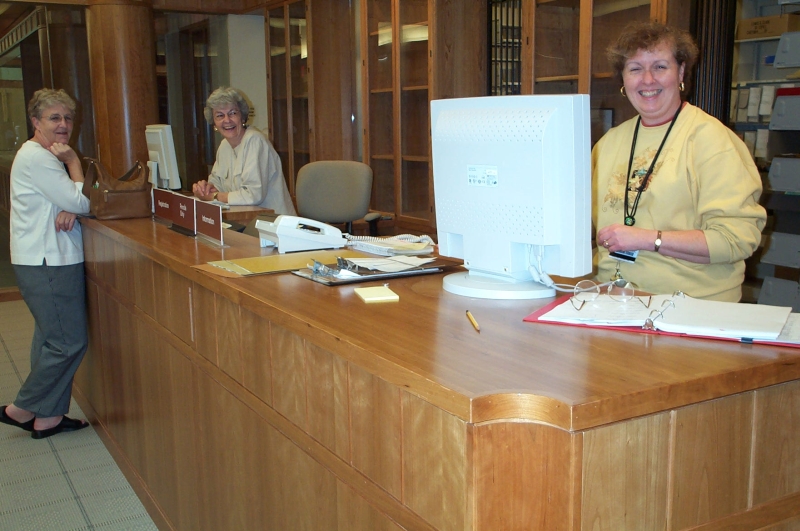
Ladies: I lied when I said I wouldn't put your picture on the Internet. Sorry.
A few minutes wait, and a 1948 issue of voices was delivered to my table, directly.
It was unclear whether or not I'd be allowed to request photocopies of the article I was interested in, but I noticed another gentleman in the reading room taking digital pictures of some old, fragile maps, inked by Thomas Jefferson's personal assistant, probably. (Except for his bookishness, this gentleman looked like a spy in some James Bond flick, leaning over documents, clicking away, his camera charge annoyingly beeping its readiness to take the next image.) I asked if it would be all right if I did the same thing, and bam! Permission granted. I had only packed the camera to document the expedition, and ended up with a memory card full of (slightly blurry) pictures of a fifty-year-old book review.
And because I am an inveterate, consummate researcher (read: anal-retentive perfectionist), I also spent twenty minutes copying out the relevant paragraphs, longhand. (On the green, ruled paper provided for me, specially!) You know you're a geek when you start describing italics and other Font-Variants in longhand.
The rest of my day was spent in Alderman (hey, look: David Sedaris is reading in Charlottesville later this month!), blissfully bathed in the whitehot light of the photocopiers, deciphering the cryptic locations of coded call numbers, tracking the Borgesian trail of letters and decimals around corners and down long walls of stacks, navigating the narrow, sarcophagus-like stairwells between floors. Alderman is built into the side of a hill: the front entrance is actually on the fourth floor, and the majority of the collection is underground on three sides. They even have middle floors-between-floors, like in "Being John Malkovich." going downstairs you pass 3M... 3... 2M... 2... 1M... until finally hitting rockbottom level #1. I have to mention, despite the claustrophobically-low ceilings, that the stacks were sufficently lit and the books were remarkably well-ordered (which means either the staff are particularly hard-working, or the sections I was in don't get used much).
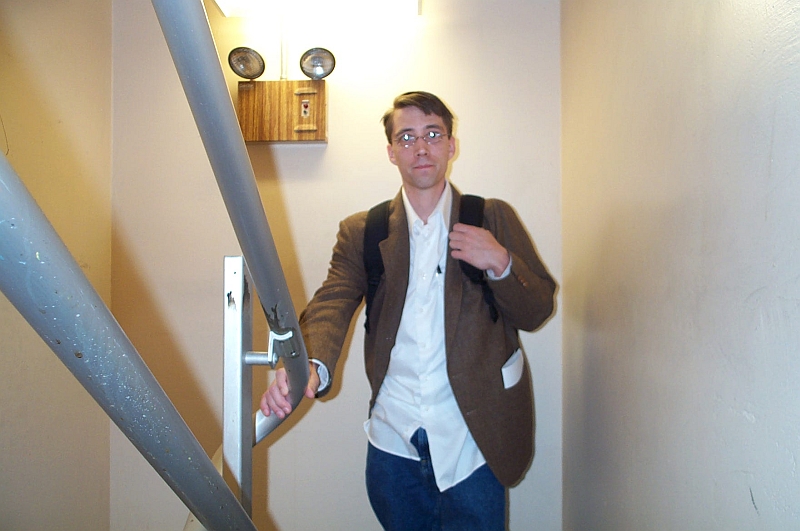
By about three o'clock I knew I wasn't going to get everything done in one day. I reshuffled my pile of citations, prioritizing by need and by speed. secondary sources went straight to the bottom of the pile. Rising to the top were reviews and poems written by my author, in old, british journals located way down in the unsubbottombasement. The journals were unbound, printed during or following the second world war on rotten, yellowing woodpulp, brittle as peanut candy, tied together into bundles of years with string. There, I encountered my only disappointment of the day: a poem had been razored out by a disrespectful vandal, forming an impromptu Burroughs cut-up, words on two adjacent pages running together to make sensical nonsense. Them's the breaks, Indiana Jonesing the Library of Doom: sometimes, some dirty collaborating Belloq gets there first.
Despite the fact that now i must seek another library with that particular volume of that particular journal, it was sort of cool, reassuring even, to find that someone had beaten me to it. That someone else had liked it enough to clip it when they read it, that it meant so much to them they would take the elevator down six floors to the basement of the library, just to steal a poem.
|
1522. Reed, Henry. "Hardy's Secret Self-Portrait." Review of The Life of Thomas Hardy, by Florence Emily Hardy. Sunday Telegraph (London), 25 March 1962, 6.
Reed says this disguised autobiography is a "ramshackle work," but is still "packed with a miscellany of information not available elsewhere, and readers who care for Hardy will find it everywhere endearing, engaging, and full of his characteristic humour."
|
The latest version of the bibliography is up. It contains citations for Henry Reed's publications in journals and periodicals, anthologies featuring Reed's poems, and for reviews and criticism of Reed's poetry and plays.
|
1521. Reed, Henry. "Leading a Dance." Review of Fokine: Memoirs of a Ballet Master, translated by Vitale Fokine. Sunday Telegraph (London), 26 November 1961, 6.
Reed finds Fokine's memoirs "very absorbing and intelligent."
|
|
|
|
1st lesson:
Reed, Henry
(1914-1986). Born: Birmingham, England, 22 February 1914; died: London, 8
December 1986.
Education: MA, University of Birmingham, 1936. Served: RAOC, 1941-42; Foreign Office, Bletchley Park, 1942-1945.
Freelance writer: BBC Features Department, 1945-1980.
Author of:
A Map of Verona: Poems (1946)
The Novel Since 1939 (1946)
Moby Dick: A Play for Radio from Herman Melville's Novel (1947)
Lessons of the War (1970)
Hilda Tablet and Others: Four Pieces for Radio (1971)
The Streets of Pompeii and Other Plays for Radio (1971)
Collected Poems (1991, 2007)
The Auction Sale (2006)
|
Search:
|
|
|
Recent tags:
|
Posts of note:
|
Archives:
|
Marginalia:
|
|







